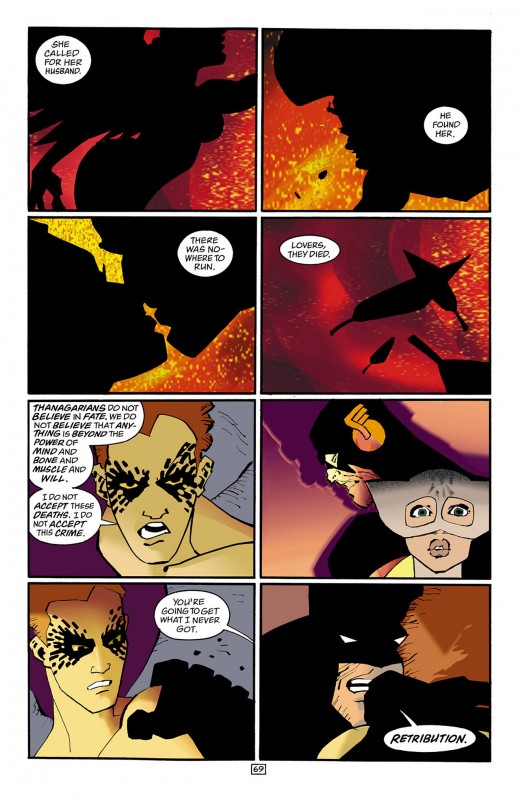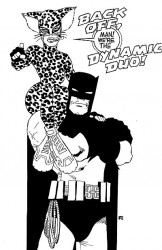
Dark Knight Strikes Again: Politics as Usual
August 26th, 2013 Posted by david brothers
I always liked this page from Frank Miller & Lynn Varley’s Batman: The Dark Knight Strikes Again. It’s one of my favorite scenes in the book, alongside all of the stuff with Supergirl. I like it more for the dialogue than anything else, though Miller’s formless, chunky Batman is an obviously great take on the character’s design. But this bit is killer, from Hawkboy’s mouth to Batman’s heart: “Thanagarians do not believe in fate. We do not believe that anything is beyond the power of mind and bone and muscle and will. I do not accept these deaths. I do not accept this crime.”
I really dig that bit, despite the Ayn Randiness of it. I like how it perfectly sketches that character out, giving him a moral immovability that’s also present in characters like Rorshach. There is Justice and there is Crime, and one must be eliminated at all costs.
Hawkboy discusses his life as if it were a conflict, a constant series of battles between Us and Them, the Just and the Fallen. There is always something To Be Triumphed Over, which ain’t necessarily the best way to look at the world. The directness of the statement appeals to me a great deal. It posits a world where change is not only possible, but possible due to the direct intervention of human hands. If something’s gone wrong, you reach out a hand, you take hold, and you fix it, and that thing has no choice but to bow to your will.
“I do not accept these deaths. I do not accept this crime.” That mentality sits at the root of a lot, if not most, superheroes. With precious few exceptions, your average superhero is doing something that is wildly illegal, but they’re doing it for “good reasons.” When people talk about how cape comics have fascist or authoritarian elements, they’re talking about Superman bending a dictator to his will, Batman creating a surveillance state for the protection of the people inside it, the Punisher playing at executioner. They are the Good Guys, so what they do is by definition Right and Just, even when it is illegal and horrible, because we know their hearts are in the right place.
This sort of doctrine really only works in comics, where you can “avenge” someone’s death and have that be an actual ending or provide closure. Real life doesn’t work like that. There are a lot of things that will bow to the power of mind and bone and muscle and will, but then there are greater things that will never bow. You will have to accept death. You will have to accept crime. You can’t pull yourself up by your bootstraps if you’re too poor to afford boots, right? But it’s nice to think about a world where we have total control, instead of none.



















